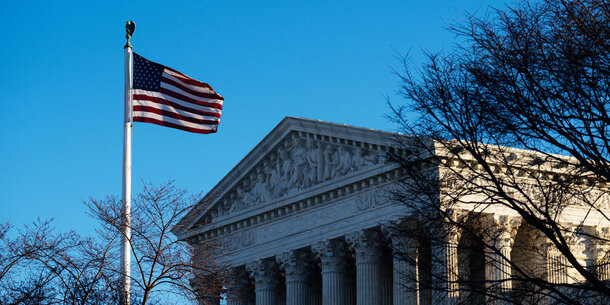Justice Jackson Most Active Questioner So Far in Supreme Court’s October Sitting
During the first four days of argument for the Supreme Court’s October sitting, Justice Ketanji Brown Jackson, the Court’s newest member and first Black woman justice, has spoken more than double the amount of words as any other justice thus far.
On Jackson’s first day on the bench, she was the third most active questioner, according to Empirical SCOTUS. Justices Amy Coney Barrett and Brett Kavanaugh were significantly less talkative than Jackson in their debuts as Supreme Court justices. Barrett spoke 490 words and Kavanaugh spoke 345 words in their first oral arguments, compared to Jackson’s 976 words in Sackett v. EPA.
Of all the arguments heard last week, Jackson spoke the most words of any justice in Merrill v. Milligan, a redistricting case in which the plaintiffs argue Alabama’s new congressional map dilutes Black Alabamans’ voting power in violation of section 2 of the Voting Rights Act. Jackson spoke uninterrupted for over three and a half minutes at one point, explaining that the framers adopted the Fourteenth Amendment in a race conscious way to eradicate discrimination.
Kansas Gubernatorial Candidates Debate How the State Picks its High Court Justices
On October 5, Democratic Governor Laura Kelly and her Republican challenger Attorney General Derek Schmidt discussed how Kansas picks its high court justices at their second gubernatorial debate.
Kelly, who has appointed three justices to Kansas’s seven-member court since taking office in 2019, said she favors the state’s current merit-selection system, in which justices are chosen by the governor from a list of candidates vetted by a nominating commission. Schmidt, on the other hand, said he supports getting rid of that commission and allowing the governor to directly appoint justices, subject only to confirmation by the state senate.
Despite their disagreement over merit-selection and direct appointments, both candidates agreed that Kansas should not adopt the approach supported by Kris Kobach, the Republican nominee for attorney general: direct partisan elections.
Changing how Kansas picks its justices would require a state constitutional amendment. Earlier this year, Republican lawmakers introduced two measures (SCR 1621 and SCR 1622) that would have replaced the state’s current system with direct appointments or partisan elections, but both failed. These bills were introduced as the high court was expected to rule on Kansas’s new Republican-drawn congressional map. (A majority of the court ultimately held the new map does not violate the state’s constitution.)
Pro-Choice Groups Accuse Republican Ohio Supreme Court Justices Running for Reelection of Ethical Violations for Sharing Views on Abortion
Pro-choice groups have accused three Republican Ohio Supreme Court justices running for reelection of violating the state’s judicial ethics rules by telling an anti-abortion PAC there is no state constitutional right to abortion.
In a candidate survey conducted by Cincinnati Right to Life before the Supreme Court overturned Roe v. Wade, Justices Sharon Kennedy, Pat DeWine, and Pat Fischer reportedly shared that they do not believe Ohio’s constitution includes a right to abortion.
Last month, the ACLU of Ohio filed a lawsuit challenging the state’s 6-week abortion ban under the Ohio Constitution, and that case is likely to be appealed to the Ohio Supreme Court. For that reason, pro-choice groups said the justices’ answers to the candidate survey violate the Ohio Code of Judicial Conduct, including the provision that prohibits judicial candidates from making statements about issues that are likely to come before them if they are elected.
In response to these claims, a spokesperson for the justices said: “the questionnaire does not ask any questions about the justices’ views on abortion laws or how they would decide a particular case… Without question, the Republican candidates for Justice will not be influenced by any particular endorsement.”

